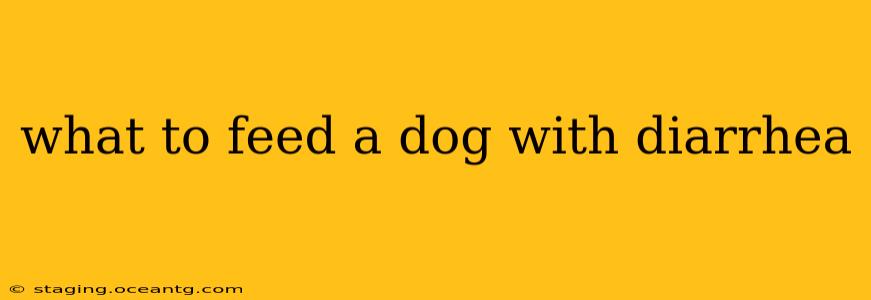Diarrhea in dogs can be a worrying symptom, often indicating an underlying issue. While a bout of loose stools might resolve itself, persistent diarrhea requires veterinary attention. This guide will help you understand what to feed your dog when they have diarrhea, focusing on bland, easily digestible foods to soothe their upset stomach. Remember, this is not a replacement for professional veterinary advice. Always consult your vet if your dog's diarrhea persists or worsens.
What Causes Diarrhea in Dogs?
Before we dive into diet, let's briefly explore the common causes of canine diarrhea:
- Dietary indiscretion: This is the most frequent culprit, encompassing eating spoiled food, garbage, or non-food items.
- Infections: Bacterial, viral, or parasitic infections can severely disrupt digestion.
- Inflammatory bowel disease (IBD): This chronic condition causes inflammation in the digestive tract.
- Pancreatitis: Inflammation of the pancreas impacts digestive enzyme production.
- Food allergies or intolerances: Certain ingredients can trigger digestive upset in sensitive dogs.
- Medications: Some medications have diarrhea as a side effect.
What Should I Feed My Dog with Diarrhea?
When your dog has diarrhea, the goal is to provide easily digestible food that will help bind the stools and soothe the irritated intestinal tract. Avoid rich, fatty, or spicy foods. Here are some vet-recommended options:
-
Plain cooked chicken and rice: Boiled, boneless, skinless chicken breast and plain white rice are excellent choices. The chicken provides protein, while the rice is easily digestible and helps to firm up stools. Avoid seasoning the chicken.
-
Plain boiled potatoes: Similar to rice, boiled potatoes (without skin) are easily digestible and can help to calm the stomach.
-
Plain cooked sweet potato: Sweet potatoes are rich in fiber, but should be offered in moderation as too much fiber can worsen diarrhea in some dogs.
-
Low-fat plain yogurt (in moderation): Plain yogurt (unsweetened and without added flavors) contains probiotics, which can help restore beneficial bacteria in the gut. Offer small amounts only, as too much dairy can worsen diarrhea in some dogs.
-
Pumpkin puree (plain, canned): Not pumpkin pie filling! Plain canned pumpkin (not pumpkin pie filling) is a great source of fiber, but again, use in moderation.
What Should I NOT Feed My Dog with Diarrhea?
Certain foods can worsen diarrhea or irritate the digestive tract. Avoid the following:
- Rich or fatty foods: These are harder to digest and can exacerbate the problem.
- Spicy foods: These can irritate the already inflamed intestines.
- Dairy products (except plain yogurt in moderation): Many dogs are lactose intolerant and dairy can worsen diarrhea.
- Raw meat or bones: These carry a higher risk of bacterial contamination.
- Table scraps: Avoid giving your dog any table scraps while they have diarrhea.
- Treats: Hold off on treats until their diarrhea has subsided.
How Long Should I Feed My Dog a Bland Diet?
Generally, you should feed your dog a bland diet for 1-2 days, or until their diarrhea improves. If the diarrhea persists beyond 2 days, or if it's accompanied by vomiting, lethargy, or blood in the stool, consult your veterinarian immediately.
How Much Should I Feed My Dog?
Offer smaller, more frequent meals instead of their usual feeding schedule. This reduces the burden on their digestive system.
Can I Give My Dog Medication for Diarrhea?
Never administer any medication to your dog without first consulting your veterinarian. They can diagnose the underlying cause of the diarrhea and prescribe appropriate medication if needed. Some over-the-counter medications can be harmful to dogs.
My Dog Has Bloody Diarrhea - What Should I Do?
Bloody diarrhea is a serious sign and requires immediate veterinary attention. Contact your vet immediately if your dog displays this symptom.
When Should I Take My Dog to the Vet?
Seek veterinary care if your dog's diarrhea:
- Persists for more than 2 days.
- Is accompanied by vomiting, lethargy, or loss of appetite.
- Contains blood or mucus.
- Is accompanied by fever.
- Results in dehydration (signs include sunken eyes, dry gums, and lethargy).
Remember, this information is for general guidance only. Always seek professional veterinary advice for your dog's specific needs. Early intervention is key to resolving diarrhea and preventing complications.
